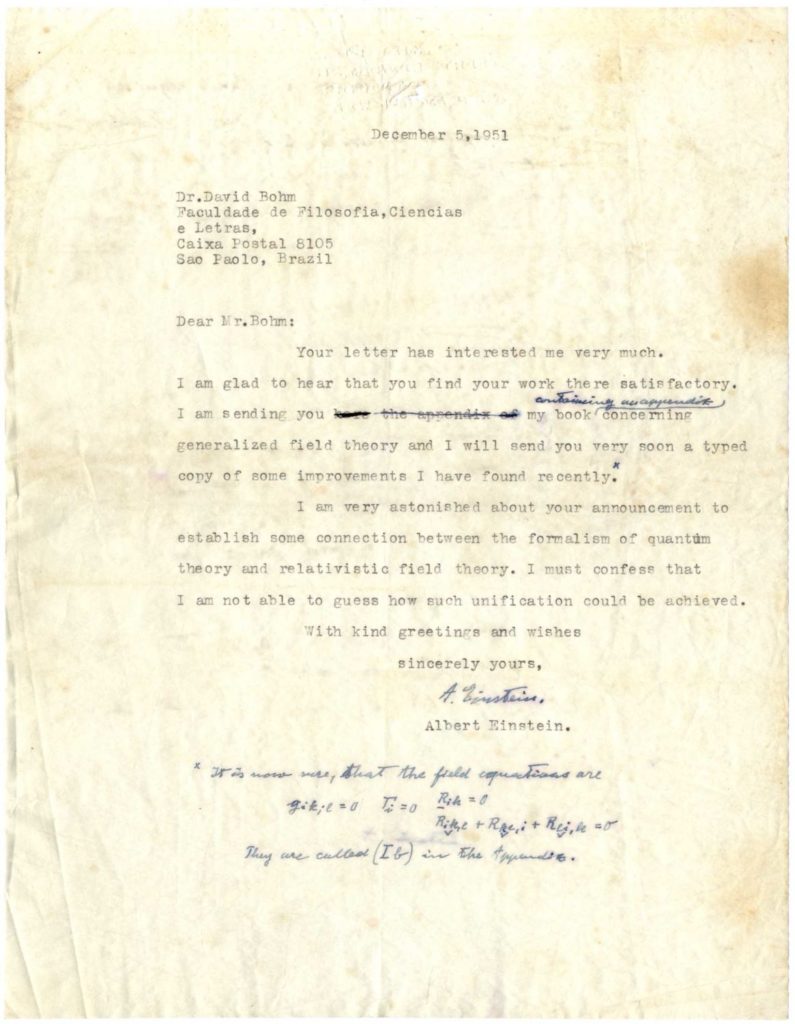
This invaluable collection of letters was written by Prof. Albert Einstein, Prof. Louis de Broglie, Prof. Wolfgang Pauli and Prof. Leon Rosenfeld.
Prof. Albert Einstein, pre-eminent Jewish researcher, was one of the greatest physicists of all times. He won the Nobel Prize for his contribution to physics, including the explanation of the photoelectric effect, his theory of relativity and the quantum theory.
In this collection, Einstein discloses his scientific approach to current issues and to the basis of his scientific approach as a whole. He highlights the importance of an intellectual environment, the importance of government support for research and development, and expresses –restrainedly – his admiration for the scientific research taking place in Israel. Einstein comments about his attitude regarding the complexity of nature, his opinion about the Creator and His manner of operating, and about difficulties regarding the continuation of the development of the quantum theory. He reflects upon the spread of racism in Germany and suggests insights that humanity should remember in order to prevent the repetition of these tragedies in the future.
The other writers were also internationally renowned, top-notch physicists who promoted many theories in physics. Other than Prof. Leon Rosenfeld, all were Nobel Prize winners. These letters discuss the topics of research and theories that the writers were exploring. At times, they present their approach to scientific studies as a whole and theoretical physics in particular.
Most of the letters were sent to Prof. David Joseph Bohm (1917-1992). Dr. Bohm was a professor at Princeton University where he worked together with Albert Einstein. At the start of the McCarthy era, Prof. Bohm refused to testify against people suspected of being communists. This led to his arrest in 1950 and his suspension from the university. After he was acquitted, he moved to Sao Paulo, Brazil where he was appointed head of the physics department. In 1955, he moved to Israel and served as a visiting professor in the Technion. Two years later, he moved to England where he worked in the Universities of London and Bristol.
Provenance: The letters are from the bequest of Mrs. Sarah Bohm, widow of Professor David Bohm.
Signed letter from Prof. Albert Einstein to Prof. David Bohm. Princeton, New Jersey, 1951.
Specifications: [1] leaf, letterhead. 28×21 cm. Typewritten letter with his signature, corrections and additions in his handwriting in the letter itself. At the end of the letter, Einstein added a physics formula with an explanation.
Background: Einstein was happy to hear that Prof. Bohm is satisfied with his work in Sao Paulo. He sent him a copy of his work discussing generalized field theory and notes that he will be sending him improvements that he recently discovered on the matter. To further explain the matter, Einstein adds elucidations and formulas on the bottom of the leaf. Einstein notes that he was very surprised to hear about Bohm’s attempts to find a connection between “the formalism of quantum theory and relativistic field theory.” He admits that he cannot guess how much unification can be achieved.
Condition: Fine. Minimal stains. Light tear in the upper section of the letter, not affecting text.
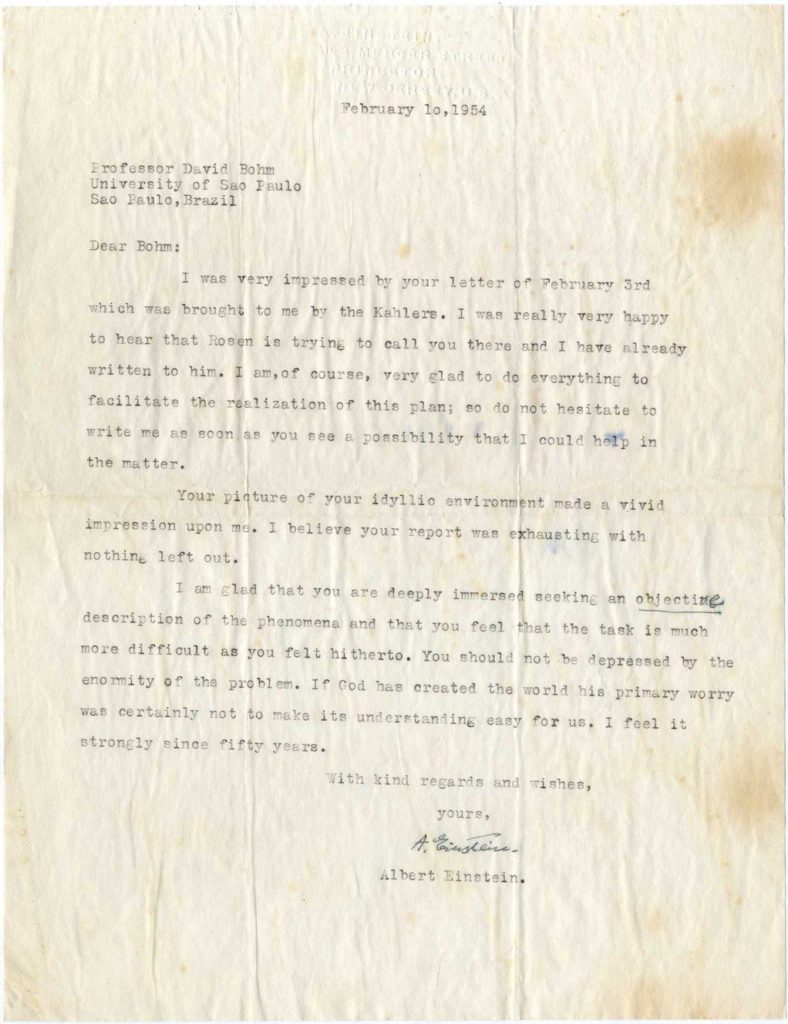
Signed letter from Prof. Albert Einstein to Professor David Bohm, Princeton, New Jersey. 1954.
Specifications: [1] pages. Letterhead. 28×21 cm. The letter is typewritten. One word was edited in Einstein’s handwriting and the letter was signed by Einstein at its conclusion. Einstein’s address is embossed at the top of the leaf.
Content: Einstein notes that he is happy to hear about developments in Bohm’s affairs and offers to help him however he can. He also writes that he is happy that Bohm is searching for an objective description of the phenomena and that he concludes that the issue is much more complicated than he had previously thought. He notes that one should not be depressed by the magnitude of the problem: ” If God has created the world his primary worry was certainly not to make its understanding easy for us. I feel it strongly since fifty years.”
Condition: Fine. Creases and aging stains.
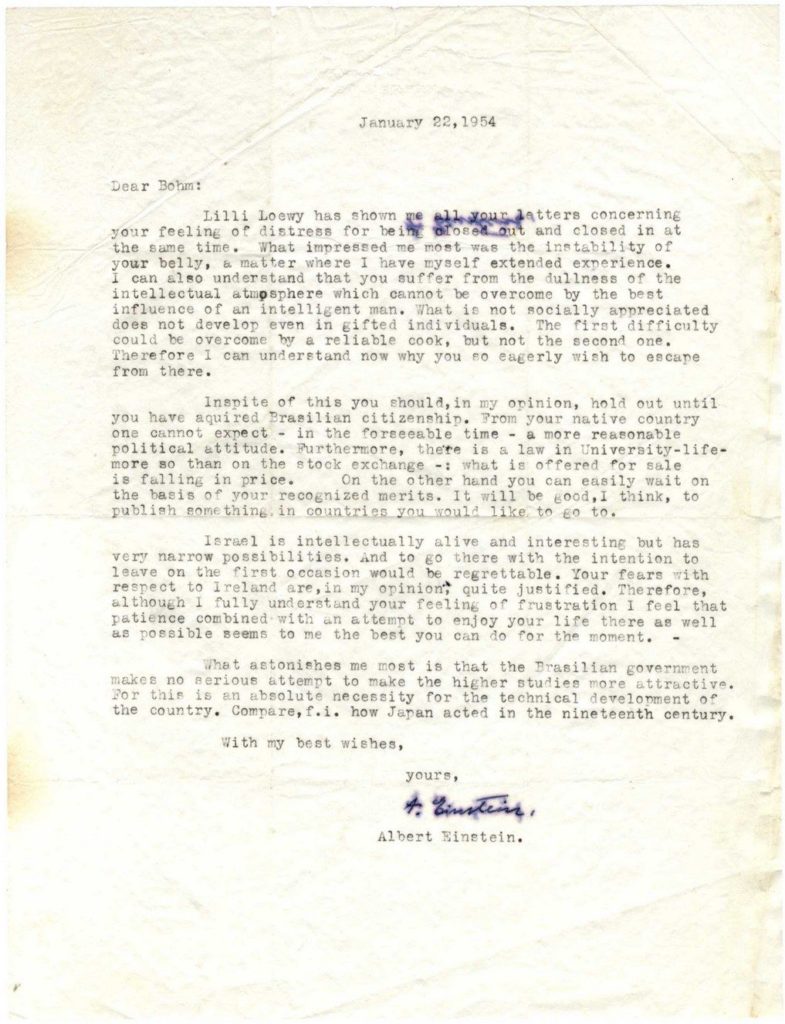
Letter from Prof. Albert Einstein sent to Prof. David Bohm regarding frustration felt by isolated intellectuals, investment in research and development and employment opportunities for scientists in Israel. 1954.
Specifications: [1] page. 28×20 cm. Typewritten letter, signed by Prof. Einstein with corrections in his handwriting.
Content: Einstein discusses Prof. David Bohm’s frustrations, specifically in regards to his stomach issues and the lack of an intellectual environment in Sao Paulo. Einstein empathizes with Bohm’s feelings and understands why Prof. Bohm is interested in moving:
“The first difficulty could be overcome by a reliable cook, but not the second one. Therefore I can understand now why you so eagerly wish to escape from there.”
He suggests that Bohm wait to receive Brazilian citizenship, because he does not foresee a quick change in the political approach to Bohm on the part of his native country. Einstein suggests that a rule that applies to the stock market is also applicable to university life [don’t show that you’re desperate for a position, so that your value doesn’t fall in the eyes of the employer]: “What is offered for sale is falling in price.”
He also suggests that he publish articles in the countries to which he is interested in moving. In regards to Israel, Einstein notes that Israel is an interesting, intellectual creature, but has limited opportunities. It would be a shame to move there with intention of leaving at the first possible opportunity. He also agrees with his fears regarding Ireland. Therefore, despite Einstein’s empathy with Bohm’s frustrations, he suggests that the best thing to do right now is to wait patiently and enjoy life in Brazil as much as he can.
Einstein is surprised that the Brazilian government is not making serious efforts to encourage higher studies which is an absolute necessity for the technological development of the country; in contrast to the Japanese approach of the 19th century.
Background: Prof. David Joseph Bohm (1917-1992) moved to Sao Paulo, Brazil after being suspended from Princeton University and was appointed Head of Physics in Sao Paulo. As this letter indicates, Sao Paulo lacked the intellectual environment appropriate for his studies and he wished to leave the country. Despite Einstein’s suggestions, Bohm moved to be a visiting Professor at the Technion in Israel, and two years later moved to England where he worked in the universities of Bristol and London.
Condition: Fine. Fold marks and light ink stain.
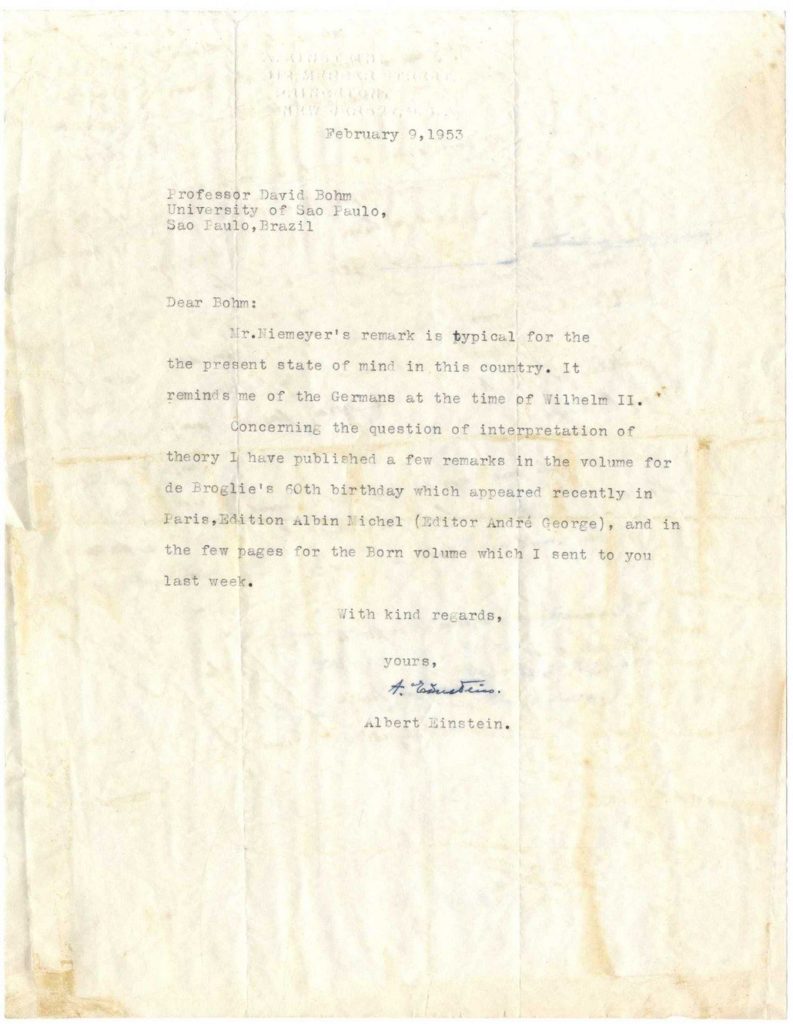
Signed letter from Prof. Albert Einstein to Prof. David Bohm. Princeton, New Jersey 1953.
Specifications: [1] page, paper. 27×21 cm. The letter is typewritten and signed by Prof. Einstein. Einstein’s address is embossed at the top of the page.
Background: Einstein writes that Mr. Niemeyer’s remark is characteristic of the present mood in the country (the United States), and it reminds him of Germany during the reign of German Emperor Wilhelm II. He also notes that he recently published comments regarding the interpretation of theory in a volume published in Paris in honor of de Broglie’s sixtieth birthday, and in a number of leaves in the Born volume, a copy of which he sent to Bohm a week earlier.
Condition: Fine. Minimal aging stains.
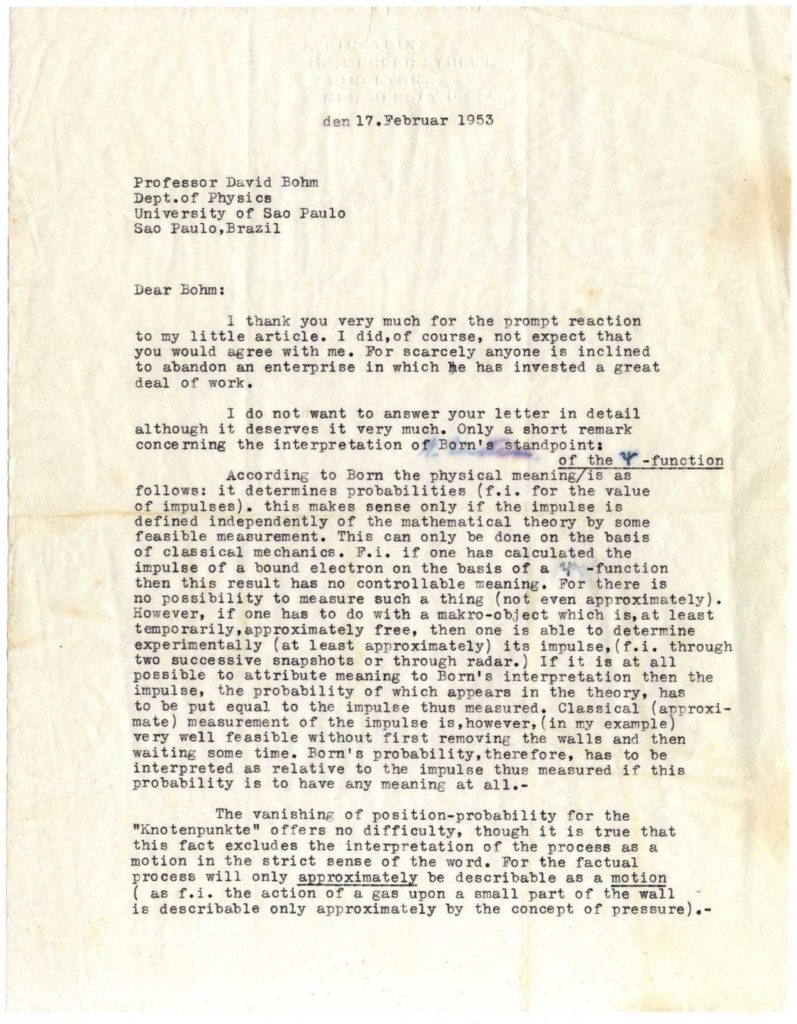
Signed letter from Prof. Albert Einstein to Prof. David Bohm. Princeton, New Jersey 1953.
Specifications: [2] leaves, letterhead. 27×21 cm. Typewritten and signed by Prof. Einstein, with additions in his handwriting.
Unique features: At the start of the letter, Prof. Einstein includes a lengthy discussion of Prof. Niels Bohr’s approach to the function of pi.
Condition: Fine. Fold marks. Light ink stains.
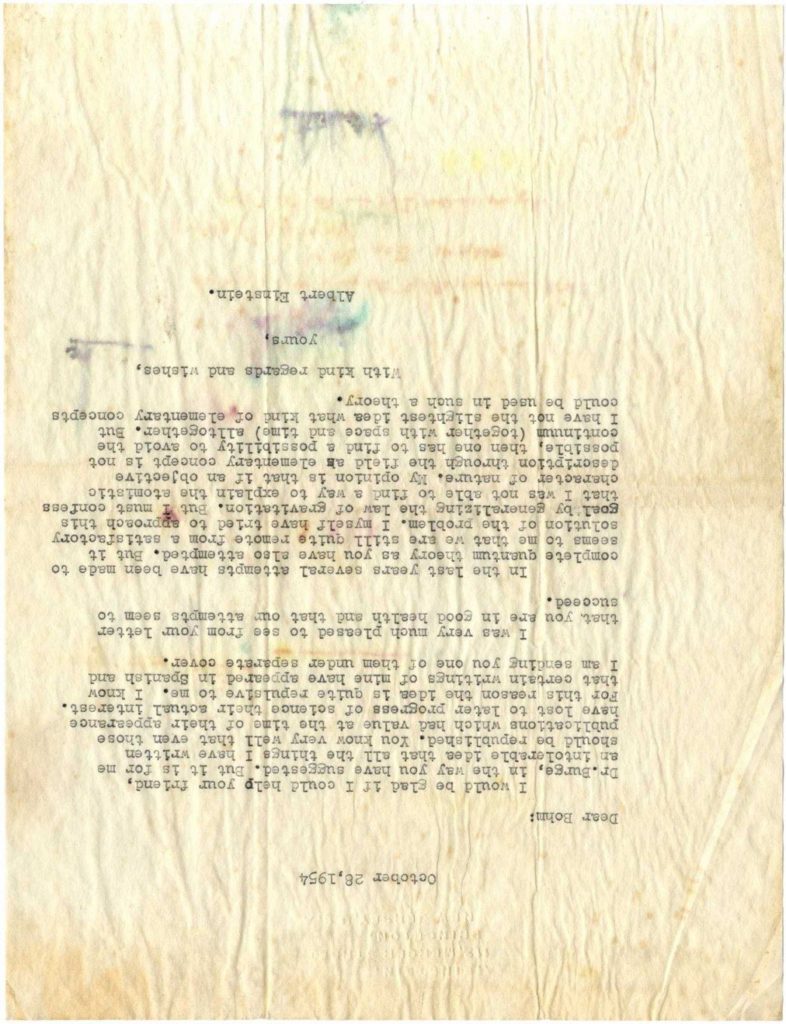
* Copy of a letter from Prof. Albert Einstein to Prof. Max Born, Princeton, New Jersey. September 7, 1944.
Specifications: [2] pages, paper. 25×20 cm. Typewritten letter, not signed. A number of corrections, apparently in the professor’s handwriting.
Content: Einstein reminisces with Born about their trip 25 years ago on a tramcar to the Reichstag, convinced that they could turn the German lawmakers into honest Democrats. He can only laugh about their naiveté back then! “We both did not realize how much more sits in the spinal cord than in the cerebrum, and how much tighter it sits.” They should remember this lesson in order to prevent a repetition of the tragedies that occurred. It’s not surprising that (most) scientists are no exception; the exceptions don’t operate through their special intellectual powers, but through their humanity, such as Laue [Max von] [who publicly opposed the Nazi policies]. Einstein notes that it was interesting to watch his sense of justice lead him to step by step detach himself from the influence of the crowd, due to his strong sense of justice. Men of medicine have no success adopting their “ethical code” and the chance of ethical conduct amongst scientists is even smaller, due to their mechanized and specialized way of thinking.
Understandings about right and wrong, develop and die, like a tree, without much influence from the fertilization they receive. The only thing an individual can do is serve as a clean personal example, courageous enough to advocate seriously his ethical convictions in the society of cynics. Einstein testifies that he himself tried to act in this manner for a long time (with changing success).
He is not overly excited by Born’s feelings that he is too old; he knows these feelings. He notes that one can confidently let nature turn him slowly into dust, unless she prefers a faster process. Einstein expresses his confidence that it is impossible to destroy “Jewish Physics.”
Einstein concludes with the fact that they both moved to radically opposing positions in regards to their scientific expectations. “You believe in the dice-throwing G-d and I believe in complete order in a world of objective existence which I am trying to catch in a wildly speculative way.” The monumental initial success of the quantum theory could not persuade him to believe “in the fundamental dice playing.”
Background: Prof. Max Born (1882-1970) was a Jewish, German-born physicist. He earned his doctorate from the University of Gottingen. He taught in the universities of Berlin and Frankfurt and in the new Institute for Theoretical Physics in Gottingen. After the Nazi rise to power, he moved to England and taught in Cambridge and Edinburgh. He returned to Germany in 1953, and received the Nobel Prize for physics a year later.
* Letter from Prof. Albert Einstein to Prof. David Bohm. Princeton, New Jersey. October 28, 1954.
Specifications: [1] page, letterhead. 27×21 cm. Typewritten letter, signed by Prof. Einstein. The signature became wet and blurred.
Content: Einstein expresses his opposition to the reprinting of his scientific writings, as new advancements in science nullified their significance.
“You know very well that even those publications which had value at the time of their appearance have lost to later progress of science their actual interest.”
He is very happy to hear about Bohm’s good health and scientific success. He notes that recently a number of experiments were attempted to complete the quantum theory, but he thinks that they are still far from a satisfying solution. He himself tried to solve the problem by generalizing the law of gravitation. But, he has to admit that he still hasn’t found an explanation for the atomistic character of nature, and he has “not the slightest idea what kind of elementary concepts could be used in such a theory.”
* Letter from Prof. Albert Einstein to Prof. David Bohm. Princeton, New Jersey. November 24, 1954.
Specifications: [1] page, letterhead. 27×21 cm. Letter typewritten and signed by Prof. Einstein. The signature was wet and has blurred.
Content: Prof. Einstein instinctively opposes the approach of Bohm and many of the physicists of his time, even though they successfully supported their theory with an impressive series of empirical findings. He does not believe in micro-and-macro-laws, but only in laws of general vigorous validity.”I believe that these laws are logically simple, and that reliance on this logical simplicity is our best guide.” It would be sufficient to start with a small number of facts. If nature is not arranged accordingly, then there is very little hope of understanding it more deeply. Einstein presents the difficulty with the using logical simplicity as a guide and he admits to the limitations of the mathematical methods existent at the time which prevent empirically-testable conclusions based on his scientific experiments. Einstein isn’t trying to convince Bohm, but only to explain how he reached his own scientific attitude. He notes “that by using a semi-empirical method, one would never have arrived at the gravitational equations of empty space.”
Condition: Fine. Rubbed ink stains.
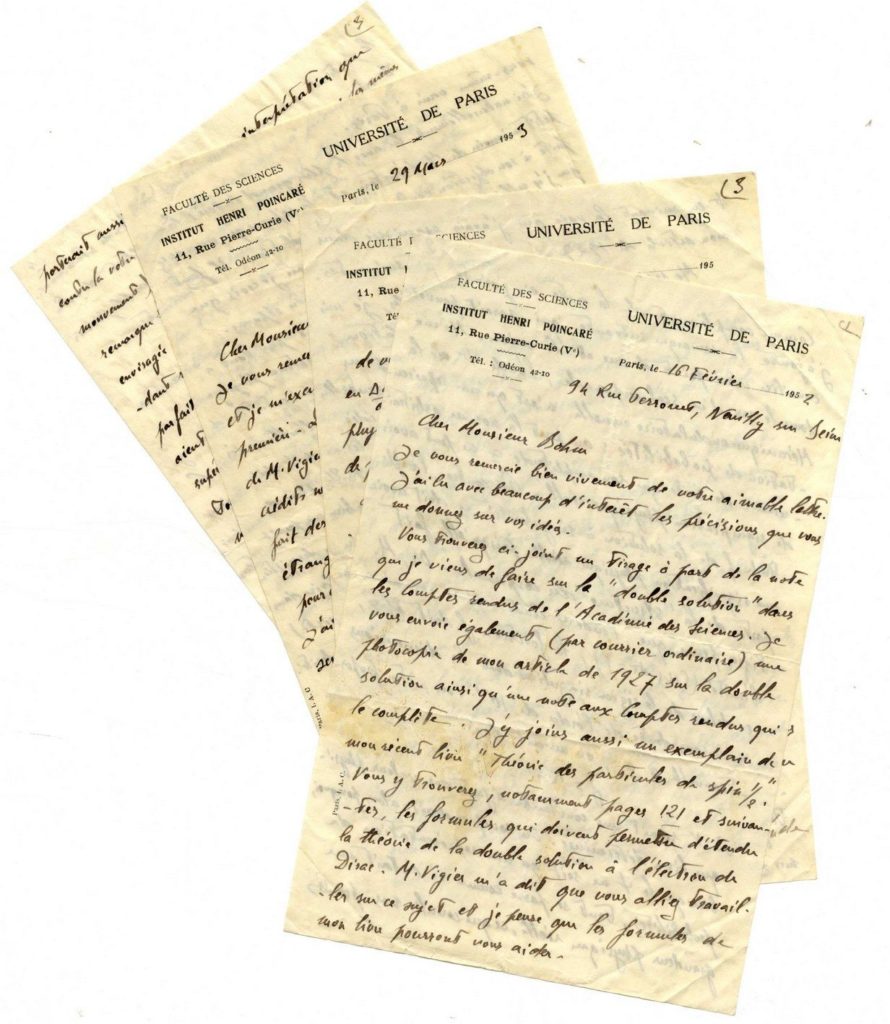
Pair of letters written and signed by Louis de Broglie, University of Paris, 1952-53.
Specifications: Each letter is [4] pages long, on the letterhead of the University of Paris. 21×13 cm. The letter was written and signed by Prof. Louis de Broglie. French.
De Broglie’s letters testify to the close cooperation between theoretical physicists in the development of the quantum theory.
* The letter from 1952 presents physics formulas that connect various theories and explain their relationship. He explains the wave function as something probabilistic and explains its relationship with physical reality, as shown by the measurements of the waves. Later on, he discusses the theories of Vigia and Albert Einstein regarding the movement of particles and discusses the significance of chemical movement of the atoms at the edges of material. He grapples with Einstein’s questions on Bohm’s theories and comments that he intends on publishing a book with notes that he wrote together with Vigia between 1924-1927. At the end of the letter, he asks Bohm about his work and expresses his hope that Vigia’s transfer to Brazil will promote his research.
* In the letter written in 1953, De Broglie writes about his efforts to secure funding for research by Vigia , who had returned from Brazil.
He continues grappling with Einstein’s claims and the explanations he gave for Bohm’s theories. De Broglie notes that the quantum theory is very subjective, and explains what he means. He then discusses the influence of Jung’s theory on his outlook on physics and how they helped him understand wave mechanics, which he developed in 1923-1926. He concludes by noting Bohm’s impending visit to France and notes that he hopes to take advantage of the time for research studies.
Background: Louis-Victor-Pierre-Raymond, 7e duc de Broglie (1892-1987) was a French physicist who studied and taught in the University of Paris. In 1929, he won the Nobel Prize for his study regarding the wave nature of electrons. His studies regarding electromagnetic radiation and his work on the de Broglie–Bohm theory strongly promoted the theory of quantum mechanics.
Condition: Very fine. Minimal aging stains.
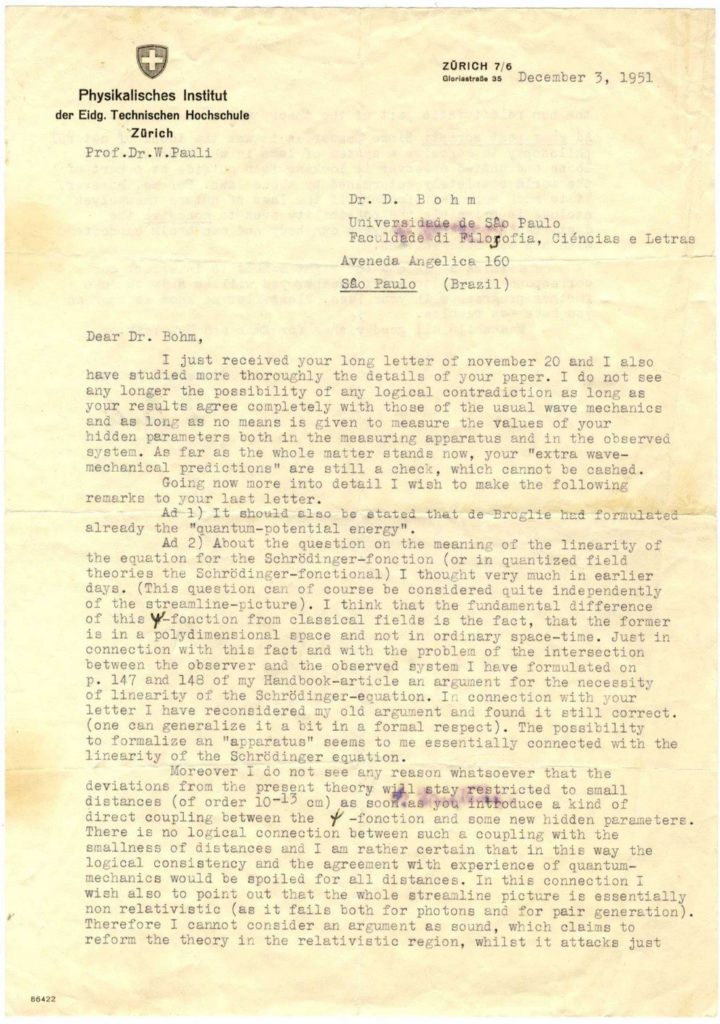
Letter signed by Prof. Wolfgang Pauli sent to Prof. David Bohm, from the Swiss Federal Institute of Technology in Zurich, 1951.
Specifications: [1] leaf, letterhead. 29×21 cm. The letter was typewritten on both sides of the leaf and was signed by Prof. Pauli with supplements in his handwriting.
Content: The letter is a response to Prof. Bohm and relates to his theories in physics regarding wave mechanics, quantum potential energy, the significance of linear equations in regards to the Schrödinger function and more.
Background: Wolfgang Ernst Pauli (1900-1958) was an Austrian physicist who won the Nobel Prize. After earning his Doctorate from the Munich University, he started doing research at the University of Gottingen and the University of Cophenhagen. He also lectured at the University of Hamburg. In 1940, he moved to the United States and served as Professor of Theoretical Physics at Princeton University. In 1945, he received the Nobel Prize for the “exclusion principle” also known by his name, the “Pauli Principle.” Though he did not publish many studies, and though many of his conclusions were never published, he significantly contributed to the study of quantum mechanics and shared his insights in letters to his colleagues – as he does in this letter.
Condition: Fine. Fold marks and tiny tears in the folds, not affecting text. Minimal stains.
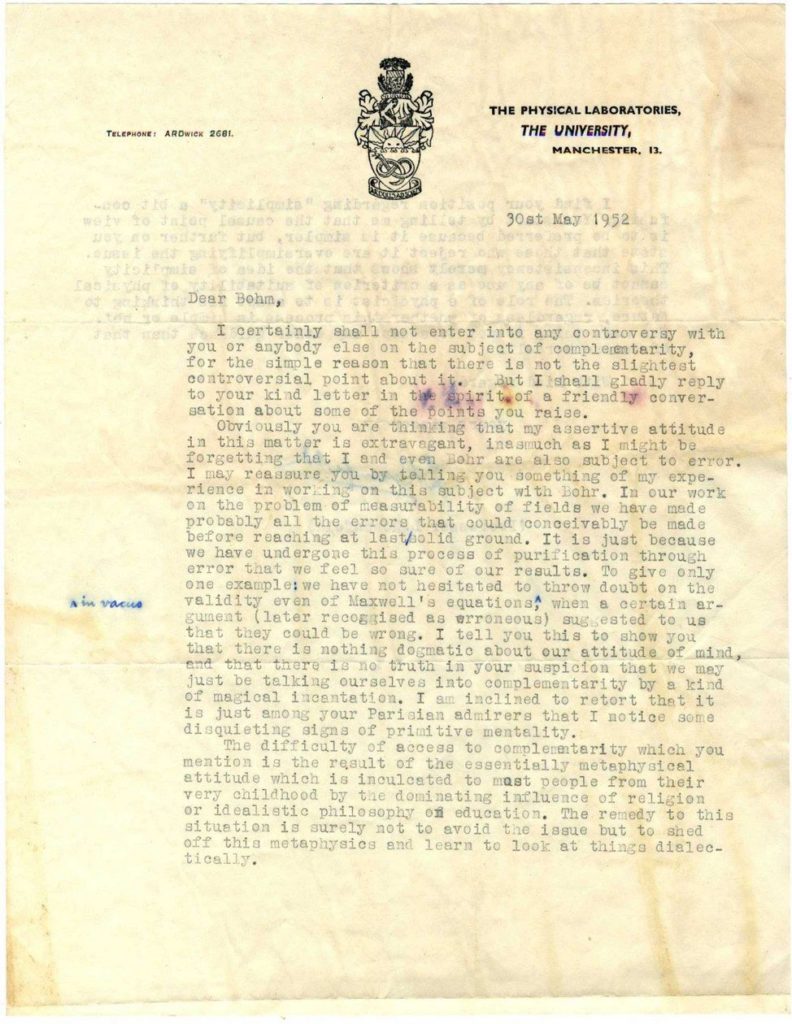
Letter signed by Prof. Leon Rosenfeld to Prof. David Bohm, Manchester University Laboratory, 1952.
Specifications: [1] leaf, letterhead. 26×20 cm. Typewritten letter on both sides of the leaf, signed by Prof. Rosenfeld with his manual corrections.
Unique features: In his letter, the writer refers to his research experiments with Prof. Bohr. He noted that the errors that cropped up during their studies led them to purify their scientific discoveries and prove their presence:
“… I and even Bohr are also subject to error. I may reassure you by telling you something of my experience in working on this subject with Bohr. In our work on the problem of measurability of fields we have made probably all the errors that could conceivably be made before reaching at last solid ground. It is just because we have undergone this process of purification through error that we feel so sure of our results.”
He also notes the difficulty that most people have adopting a scientific approach, because of metaphysical worldviews they have held since their childhood and the influence of religion and idealistic philosophy. The researcher should not ignore this phenomenon, but rather should learn to shed metaphysics and view reality in a dialectic manner.
Regarding Bohm’s tendency to prefer explanations due to their simplicity, Rosenfeld writes that the compatibility of a physical theory is not dependent on its simplicity; a physicist should harmonize his thoughts with nature, whether the ideas are simple or not.
Background: Leon Rosenfeld (1904-1974) was a Belgian physicist who collaborated with physicist Niels Bohr. He researched many elements of physics: quantum electrodynamics, statistical mechanics, the quantum field theory and more.
Condition: Fine. Minimal stains.